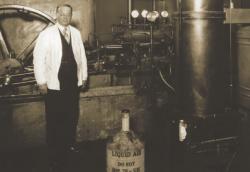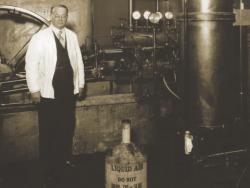Working in Bailey Hall on December 7, 1905, Hamilton P. Cady and David F. McFarland discovered significant amounts of helium in a natural gas sample from Dexter, Kansas. Cady and McFarland subsequently analyzed more than 40 other gas samples, showing that helium, previously thought to be rare on Earth but abundant in the Sun, was available in plentiful quantities from the Great Plains of the United States. Helium-filled blimps were vital to the United States in World War II, and helium is still considered a national strategic reserve material.




